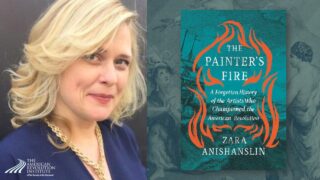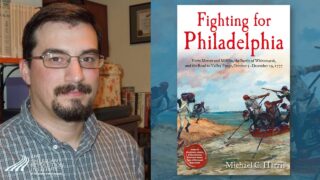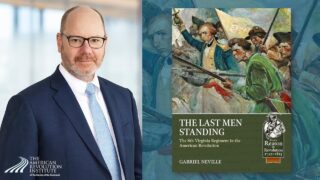Supporting scholarship and promoting popular understanding of the American Revolution is central to the work of the American Revolution Institute. The Institute welcomes distinguished scholars and authors to share their insights and discuss their latest research with the public at Anderson House through lectures, author's talks and panel discussions. The Institute also hosts a variety of other historical programs throughout the year, including our Lunch Bite object talks, battlefield tours, special Anderson House tour programs and other events. Many of the events we offer are free.

July 2025
Author’s Talk—The Painter’s Fire: A Forgotten History of the Artists Who Championed the American Revolution
Historian Zara Anishanslin discusses her new book that highlights three remarkable artists devoted to the pursuit of liberty. The American Revolution was not only fought in the colonies with muskets and bayonets. On both sides of the Atlantic, artists armed with paint, canvas, and wax played an integral role in forging revolutionary ideals. Drawing from her new book, Dr. Anishanslin charts the intertwined lives of three such figures who dared to defy the British monarchy—Robert Edge Pine, Prince Demah, and…
Find out more »August 2025
Author’s Talk—Fighting for Philadelphia: Forts Mercer and Mifflin, the Battle of Whitemarsh, and the Road to Valley Forge
The weeks of bloody maneuvering and fighting along the Delaware River at Fort Mercer, Fort Mifflin, and Gloucester receive but scant attention in the literature of the American Revolution. The same is true for the five-day Whitemarsh operation and other important events in December 1777. This period of the war began when Gen. Sir William Howe’s army of 16,500 British and Hessian soldiers set out aboard a 265-ship armada from New York to capture Philadelphia in late July 1777. Six…
Find out more »Author’s Talk—The Last Men Standing: The 8th Virginia Regiment in the American Revolution
Independent historian Gabriel Neville highlights the Revolutionary War service of a unique detachment of the Continental Army: the Eighth Virginia Regiment. In colonial America, thousands of German and Irish immigrants settled in Virginia’s western reaches. The Eighth Virginia Regiment was conceived to recruit them, and as they were sent into some of the hardest service of the war, only a few remained after the Siege of Yorktown. Drawing from his new book, Neville traces the lives of the immigrant recruits…
Find out more »

